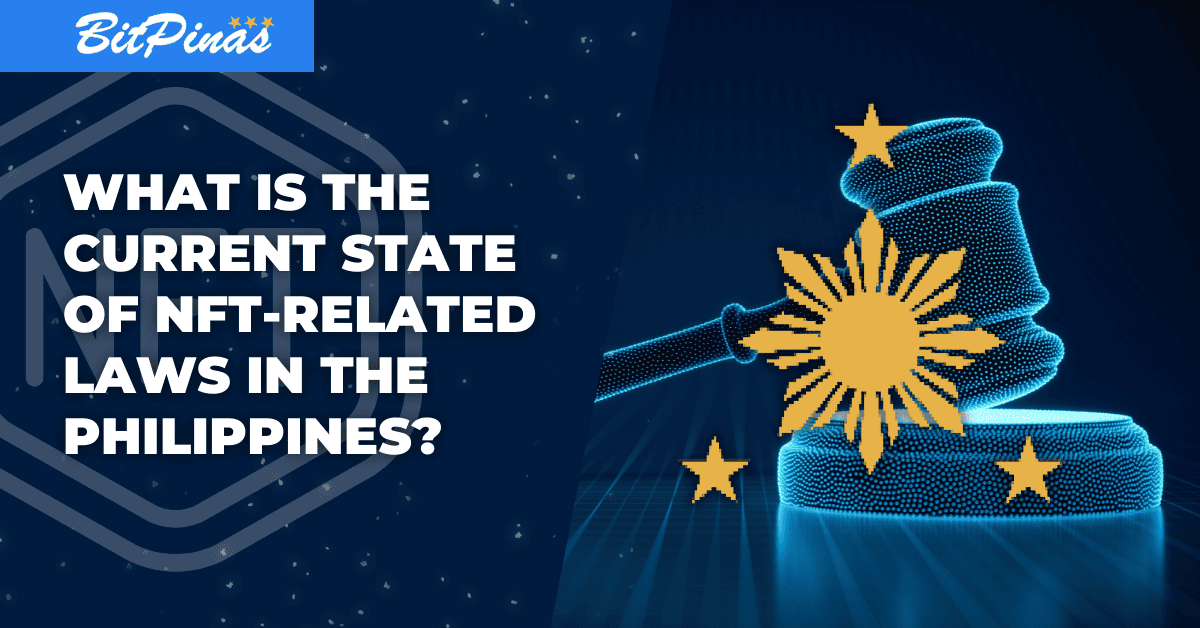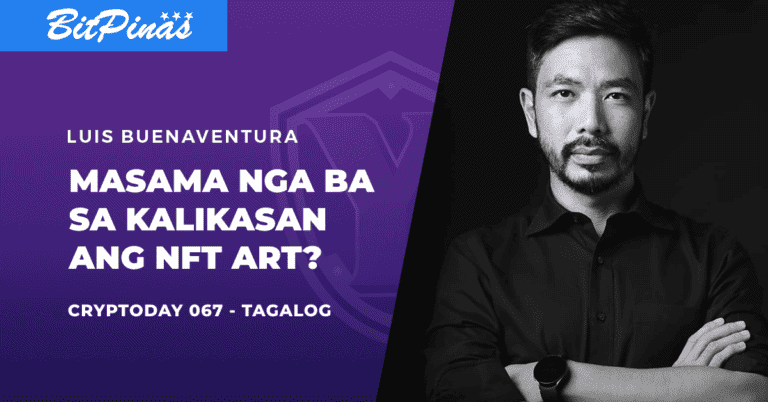What is the Current State of NFT-related Laws in the Philippines?
From property rights to IP Code, here’s everything you need to know about NFT laws and crypto art regulation in the Philippines.

Atty. Padilla Clears There is No Specific Law About It, But Its Use Cases are Regulated
By Nath Cajuday
“Nothing specific (law about) sa NFT. Pero meron tayong mga batas na nag-a-apply with respect to some of the use cases for NFT, the same manner na crypto in itself, and blockchain technology is not specifically regulated. It’s actually the use case that’s being regulated.”
(There is no specific law about NFTs. But we have laws that are applied with respect to some of the use cases for NFT – in the same manner as with cryptocurrency and blockchain technology. It is actually the use cases that are regulated.)
This is the clarification of Atty. Rafael Padilla, a commercial lawyer specializing in fintech and crypto, when asked about the current state of Non-Fungible Token (NFT)-related laws in the country during a Twitter Space hosted by BitPinas last March 25, 2022.
What are the existing laws that regulate the use cases of NFT?
Intellectual Property Code Of The Philippines (Republic Act 8293)
According to Padilla, NFT collectors must consider its copyright and intellectual property implications under the country’s Intellectual Property Code.
“Wala namang sinasabing specific sa Intellectual Property Code about NFTs pero syempre nag-a-apply na rin ‘yang batas na ‘yan kahit sa bagong technology katulad ng NFT.”
(There is no specific ruling in the Intellectual Property Code about NFTs but it still applies even to this new technology like NFT.)
He also emphasized that the Intellectual Property Code of the Philippines is uniform with respect to other jurisdictions.
“So, minsan, ‘pag may mga tanong o legal questions na mahirap sagutin ‘pag ni-research mo, you’ll discover that some of those questions have been addressed in other jurisdictions and they are useful guidance in resolving the same issues here in the Philippines.”
(Sometimes, there are some legal questions that appears complicated but actually, you will discover that these questions have been addressed in other jurisdictions and they are useful guidance in resolving the same issues here in the Philippines.)
The Securities Regulation Code (Republic Act 8799)
The Securities Regulation Code regulates NFTs when these tokens are used as an investment product, or if designed as an investment vehicle itself, according to Padilla.
“This is to distinguish NFT as a speculative asset, that the market sometimes treats NFT as a speculative asset and they trade it.”
The commercial lawyer cited Fractionalized NFTs and NFT Index Fund as examples where the Securities Regulation Code is relevant.
Fractionalized NFTs is the process of dividing the ownership of an NFT into different individuals or entities.
NFT Index Fund is an index-based approach for NFT investors to participate in the market.
The Anti-Money Laundering Act of 2001 (Republic Act 9160)
Meanwhile, Padilla also clarified that NFT platforms are not covered with the country’s Anti-Money Laundering Law because NFTs do not belong to the list of Bank Insurance Companies, Money Service Business, Gaming Companies, and Casinos.
This means that NFT platforms are not required to register in the Anti-Money Laundering Council.
However, he reminded all the project founders to be careful about the risk of money laundering in the market.
“Pinapaalalahanan pa rin natin ang mga project (producers) natin, mga founders, na napag aralan na kasi na sa traditional art market, kahit pa sa cryptocurrency, maraming money laundering risk na involve. So, kapag pinagsama mo pa ‘yung crypto tsaka art pagdating sa use case ng NFT sa crypto art, kailangan lang mag-ingat ng mga NFT platforms na hindi maabuso ‘yung platform nila sa money laundering.”
(We are reminding the project producers and founders, it was already studied that there are many money laundering risks involved in both the traditional art market and cryptocurrency. So, when these two are combined in NFT’s use case in crypto-art, NFT platforms should be mindful that their platform will not be abused in money laundering.)
In relation to this, Padilla highlighted that he recommends the KYC or Know Your Client system.
“Tapos dapat, mino-monitor din nila yung mga transactions para lang maiwasan na magamit ‘yung platform sa money laundering.”
(Then they should also monitor their transactions so that they can make the platform is not used for money laundering.)
National Internal Revenue Code Of 1997 and Other Revenue Regulations
Padilla explained that NFTs are not mentioned in the National Internal Revenue Code when it comes to taxation.
He added that even the latest revenue regulations of the Bureau of Internal Revenue (BIR) do not tackle NFTs.
However, there is a concept in the law that gives a broad definition about the income tax purposes.
“It taxes all income from whatever sources. It also taxes incomes in dealings in property. I think, lahat naman tayo dito sa community, naniniwala na ang NFT ay property o ito ay asset.”
The author of the book “Fintech: Law and First Principles” emphasized that when NFTs are treated as an asset, then they are capable of being taxed.
“Therefore, kapag dini-deal mo yan, nagte-trade ka sa NFT as a property at ikaw ay nagkaroon ng capital gain diyan or kahit pa ordinary gain kahit pa ikaw ay (nasa) negosyo tapos nagte-trade ka ng NFT. Sa ganun, masa-subject pa rin yan sa tax under our existing laws kahit pa hindi binabanggit specifically ang NFT.”
(Therefore, when you are dealing and trading NFT as a property and you have gained capital, whether a capital gain or ordinary gain, or even if you are in a business then you are trading NFTs, then you are subjected to tax under our existing laws, even if NFT is not mentioned.)
Read More: Cryptocurrency Tax Philippines Guide
Consumer Act of the Philippines (Republic Act 7394) and Electronic Commerce Act (Republic Act 8792)
Padilla also highlighted the importance of consumer protection.
He stressed that the Department of Trade and Industry (DTI) regulates this when it comes to products, and NFTs that are available in the marketplace are considered as a product.
“So, importante sa mga marketplaces natin dito is ini-implement din natin ‘yung mga rules ng DTI pagdating sa consumer protection.”
(It is important for our marketplaces to implement the rules of DTI when it comes to consumer protection.)
In addition, he clarified that marketplaces for NFTs are not required to apply for the license but there is a guideline known as E-Consumer Protection Guidelines that was set last 2008 and is a joint memorandum of DTI, Department of Agriculture (DA), and Department of Health (DOH).
“Ang objective niya is to ensure lang na ang mga consumers who are purchasing products online (are protected). For example, NFT, although hindi naman binabanggit again and ang NFT doon sa guidelines na ‘yun kasi 2008 pa ‘yun.”
(Its objective is to ensure that consumers who are purchasing products online are protected. For example, NFT, although NFTs are not mentioned in the guidelines because that was created last 2008.)
“Gayunpaman, nag-a-apply ‘yung prinsipyo na kung ang produkto, katulad ng NFT, ay binebenta sa isang online na platform ay dapat niyang sundin itong consumer protection guidelines na ito.”
(Nonetheless, the principles apply to products like NFTs that are sold in an online platform, they must follow the consumer protection guidelines.)
In the same Twitter space, Padilla explained that there are still no new regulations about NFTs and blockchain.
He also shared that for him, the Blockchain Digital Technology Act of 2020, or House Bill 7864 is already dead. (Read: Key Highlights of the Blockchain Digital Technology Act of 2020)
“From my observation, there is an understanding that the technology itself, whether that’s cryptocurrency, whether that’s blockchain, whether that’s NFT or smart contracts, [are] something that the law does not have to regulate. Okay, it’s actually the use cases [that are regulated],” Padilla concluded.
This article is published on BitPinas: What is the Current State of NFT-related Laws in the Philippines?
*None of the above should be construed as investment advice.
Disclaimer: BitPinas articles and its external content are not financial advice. The team serves to deliver independent, unbiased news to provide information for Philippine-crypto and beyond.





![[Event Recap] AxieCon Watch Party 7 [Event Recap] AxieCon Watch Party](https://bitpinas.com/wp-content/uploads/2022/09/image4-1-768x432.jpg)